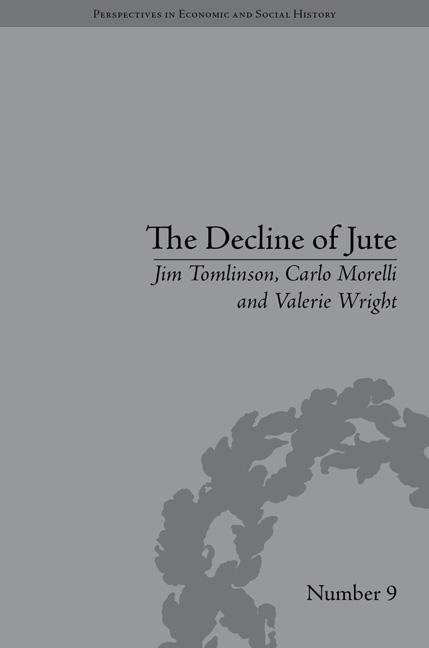
-
The digital format of this book is no longer available to purchase from Cambridge Core. Other formats may be available.
-
Select format
-
- Publisher:
- Pickering & Chatto
- Publication date:
- Invalid date
- Invalid date
- ISBN:
- 9781848931244
- Dimensions:
- Weight & Pages:
- 00kg,
- Dimensions:
- Weight & Pages:
- Subjects:
- History of Science and Technology, History
You may already have access via personal or institutional login- Subjects:
- History of Science and Technology, History
Book description
Up until the First World War a number of staple exports formed the core of Britain’s industrial economy, employing a large workforce and developing the towns and cities associated with them. While the nineteenth century saw the rapid expansion of these export industries, the twentieth century was marked by their extensive decline.Jute was one industry that experienced such a contraction. As the export of processed jute declined, both the employers and the government faced the problem of managing this descent. Located almost entirely in and around Dundee, jute provides a valuable case study of a local industry but also an important insight into Britain’s managed economy. By looking at jute as the forerunner of decline this study assesses the successes and failures of these efforts. It also addresses broader arguments about the political economy of twentieth-century Britain.
Reviews
"'This superb book deserves to be considered for a prize...a remarkable achievement.'"
Gordon Stewart
"'Some themes of the book will be of interest to specialist readers: a great deal of information about Dundee and its relationship with the national government is presented, and the authors give a good analysis of the “gendered character of the industry’s labour force”'."
Contents
Metrics
Full text views
Full text views help Loading metrics...
Loading metrics...
* Views captured on Cambridge Core between #date#. This data will be updated every 24 hours.
Usage data cannot currently be displayed.
Accessibility standard: Unknown
Why this information is here
This section outlines the accessibility features of this content - including support for screen readers, full keyboard navigation and high-contrast display options. This may not be relevant for you.
Accessibility Information
Accessibility compliance for the PDF of this book is currently unknown and may be updated in the future.

